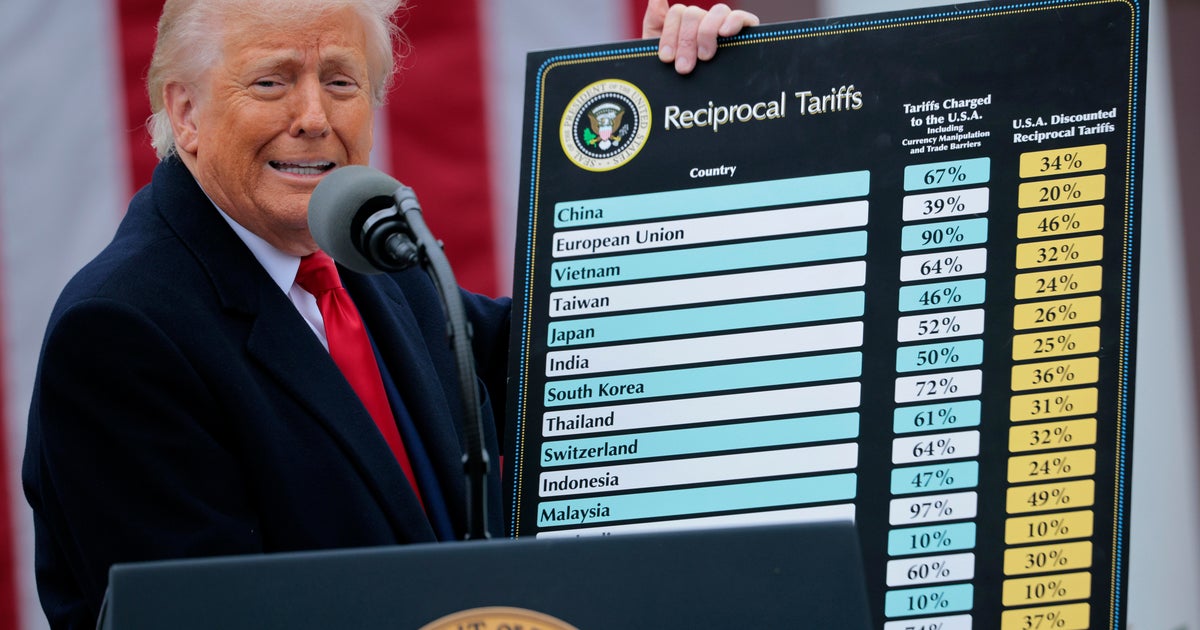

A 90-day freeze on sweeping U.S. tariffs is set to expire on July 9, sowing economic uncertainty as the Trump administration works to revamp the terms of global trade.
The stakes for millions of U.S. consumers and businesses are high. Economists warn that the barrage of import duties announced on April 2, which President Trump called "Liberation Day," could trigger another bout of inflation, put smaller companies out of businesses and dent financial markets.
As next week's deadline approaches, the Trump administration has touted new trade agreements with countries including China, the U.K. and Vietnam, while the status of other pacts remains under wraps. Mr. Trump told reporters on Friday that the the U.S. is likely to start informing some countries on Friday what tariffs their exports will face. Earlier in the week, he said doesn't plan to extend the July 9 deadline, leaving little time to clinch bilateral deals with dozens of other countries.
Under the April 2 tariffs, imports from some nations would only face a 10% universal tariff, while some Asian nations, such as Cambodia, would also be subject to duties of 49%. If the new tariffs take effect next week, country-specific rates would be added to the baseline 10% charge on all U.S. imports.
That 10% duty has been in effect since early April, while the so-called reciprocal rates have largely been temporarily suspended. Additionally, many goods from Canada and Mexico have been exempted from 25% tariffs under the U.S.-Mexico-Canada Agreement.
Chinese goods, which were temporarily subject to levies of as high as 145%, are currently subject to 30% across-the-board tariffs.
If the U.S. fails to arrange trade deals with some nations by the deadline, country-specific tariffs would take effect after midnight on July 9, substantially hiking duties on billions of dollar in foreign imports from all corners of the globe.
The White House didn't immediately respond to a question about whether it could announce more trade deals by the July 9 deadline.
Kicking the can?
Given the complexity of trade deals, some experts think the U.S. is likely to extend the tariff freeze pause for some nations.
"It can take a lot more time [than 90 days] to truly iron these things out," Clark Packard, a trade policy expert and research fellow at the Cato Institute, a nonpartisan public policy think tank, told CBS MoneyWatch.
Countries that Trump administration officials see as negotiating in good faith could be given a longer runway, while tariffs are likely to rise on July as scheduled for nations viewed as less compliant, he added.
"I think countries the administration believes are not bending at the knee or kissing the ring are likely going to face tariff snapbacks," Packard said.
Although imposing sharply higher tariffs on dozens of countries could scare some investors and fuel concerns about higher prices in the U.S., extending the tariff freeze would prolong uncertainty for millions of U.S. businesses.
"The threat of tariffs, and this uncertainty, causes capital to sit on the sidelines. You cannot plan out a year from now if you if you can't even figure out what your costs are going to be in a week," Packard said. "All of that causes uncertainty, and that's the enemy of investment and broader economic growth, which are the kinds of things we want in the economy."
3 buckets
Patrick Childress, an international trade police attorney at law firm Holland & Knight, expects the countries subject to higher U.S. tariffs to fall into three different broad categories as the clock strikes on July 9.
First, he thinks "a modest number" of trade agreements will be finalized before the deadline. Under the new U.S. deal with Vietnam, for example, Mr. Trump said the country's imports would be subject to levies of 20%, plus a 40% tariff on goods that pass through Vietnam from other countries. In return, Vietnam will allow the U.S. to sell products in the country tariff-free, Mr. Trump said.
Mr. Trump has also announced the framework of what he called a "breakthrough" deal with the U.K. that includes "billions of dollars of increased market access for American exports." Mr. Trump added that the under the terms of the deal, the U.K. would "reduce or eliminate" numerous nontariff barriers. A broad agreement with China has also been reached, according to both nations.
A number of other nations are likely to fall into a second category in which the U.S. keeps a 10% baseline tariff in place as trade talks continue, Childress said.
A third group of U.S. trading partners, having either failed to nail down a trade deal or viewed as uncooperative by American trade officials, will be hit with sharply higher tariffs as of 12:01 a.m. on July 9.
"We don't know which trading partners will fall into which of the three buckets, or how many trading partners will end up in each of three groups," Childress said.
What could happen next
"If no action is taken by the executive, the higher rates automatically go into effect," David Murphy, a customs and trade attorney with law firm GDLSK, told CBS MoneyWatch. "If he makes deals like he's done with the U.K., that pulls them out of the whole mess — their deal stands. So if he comes up with other deals and announces them before July 9, they are in that bucket as well."
Because trade policy experts don't expect all, or even most, deals to be finalized by Mr. Trump's deadline, uncertainty will likely persist, they say.
"The most likely outcome seems to be some combination of very limited agreements which would allow the U.S. to grant further extensions without losing face," analysts with Capital Economics, an investor advisory firm, said in a report. "Indeed, Trump has stated that a longer pause would be 'no big deal'. But given his unpredictability, we wouldn't rule out the possibility that some countries face Liberation Day tariffs from next week."
Some experts also think a number of countries are unlikely to fold to U.S. pressure regardless of Mr. Trump's self-imposed deadline. That includes the European Union's 27-member nations, which account for a quarter of all U.S. exports, giving them significant leverage.
Meanwhile, much of Mr. Trump's trade agenda could end up in tatters after the U.S. Court of International Trade in May ruled that most of his tariffs were illegal. Although a federal appeals count in Washington, D.C., has temporarily blocked, a final ruling is pending.









-3.png)



